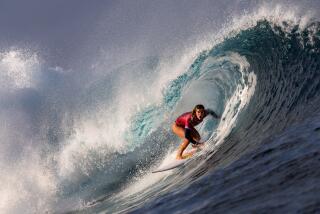Discoveries: Surf’s up!
Sweetness and Blood
How Surfing Spread From Hawaii and California to the Rest of the World, With Some Unexpected Results
Michael Scott Moore
Rodale: 328 pp., $25.99
Hundreds, “if not thousands of years ago,” tired Polynesian fisherman caught rides on waves that brought their long outrigger canoes to the shore. That’s one theory about the origins of surfing. Michael Scott Moore takes us through the history and evolution of the sport that has become a “big-business American export, up there with cowboys and Hollywood.” It’s a lovely ride, a sweet story told with a lilt. Moore is all over the globe — the first Welsh surfer, the politics of surfing in the Middle East, Cuban surfing (“La Otra Revolución”), the Australian connection and “the Christianized sickness of nineteenth-century Hawaiian culture” that helped, in its twisted way, to forge the character of the sport as we know it today. “A more evanescent sport,” Moore writes, “is hard to imagine.” Durable beyond the limits of pop culture, addictive, rehabilitating, sociable, Zen. “It has good energy,” Japanese surfer Taro tells Moore. “It’s like work. Paddle, paddle — and sometimes, big wave come!”
Kook
What Surfing Taught Me About Love, Life and Catching the Perfect Wave
Peter Heller
Free Press: 326 pp., $15 paper
“Kook” is the story of Peter Heller’s one-year search for adventure on the Southern California coast, from Huntington Beach down to Mexico. “Kook” is the derisive term for a beginner — Heller had just written a book on the deepest gorge in Tibet. Middle-aged and back home in Colorado, he weighed the virtues of staying put, living life small or lighting out, again, for the territory. He thought about commitment. When the call came to take a vacation with an old friend and learn to surf, Heller stopped weighing and flew to California. “Are we having a midlife crisis?” he asks his friend. “Definitely.” Heller rediscovers things he thought he understood: the ocean, pure effort, commitment, exhaustion, beauty. “There are two ways of moving through the world,” he explains in a philosophical moment. “Light or heavy. Swift or bogged down.” From Bolsa Chica to Rio La Laja, Heller travels light. He falls in love, with surfing, with his girlfriend, with life, again and again. “The things I love are fragile and only here for a little while,” he writes. “This is how I make a life. There is no next Thing. Just this — thud and shudder — and this.”
The Surf Guru
Stories
Doug Dorst
Riverhead Books: 276 pp., $25.95
In the title story of this brazen, roiling, confident collection, the surf guru of Padre Point “sips Chianti as he watches and looks. Sometimes he nods off in the afternoon and only awakens late at night, when the ocean breeze tickles his nose with smoke from the bonfires below.” Each of these stories has a machismo just waiting to be punctured. Doug Dorst’s characters indulge in beautiful fantasies about themselves and the people around them. They take the bare bones of not-so-pretty daily life and rearrange them into unreliable constellations. They take their own nostalgia and use it like Super glue to create lives and myths about their lives. Vikings, gangsters, surfers, bikers. “Jumping Jacks. You buy them on Mott Street from a toothless grocer who natters on about fun-fun and bang-bang beneath a canopy of decapitated poultry. You decide this man is a fool. Jumping jacks may look like firecrackers, but they don’t bang-bang. This man knows not what he sells.” Still, the narrator reconsiders: “Don’t you see it,” he asks, pointing out the potential energy in the jumping jacks. “Can’t you feel it?”
Salter Reynolds is a writer in Los Angeles.


